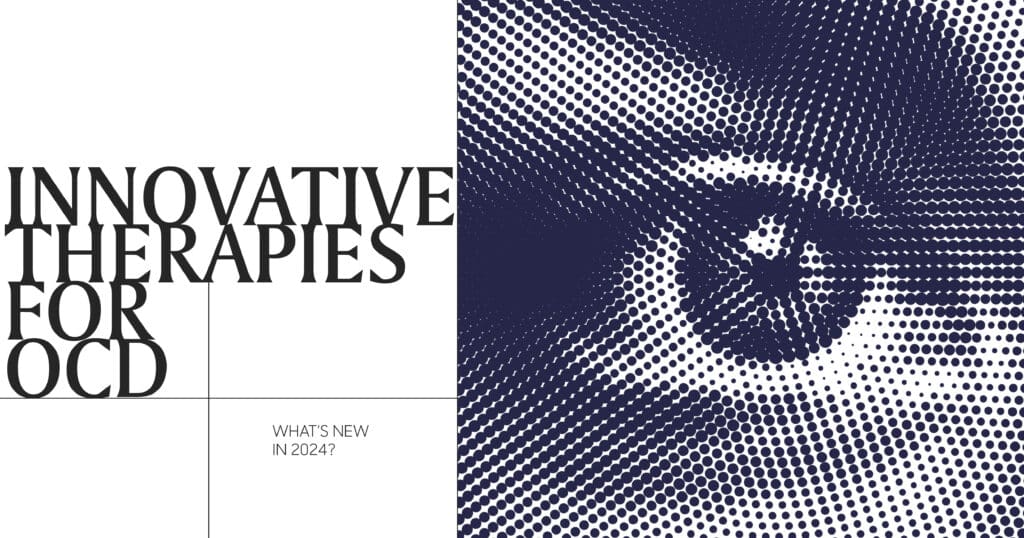Introduction
Obsessive-Compulsive Disorder (OCD) is a mental health disorder characterized by unwanted thoughts (obsessions) and repeated actions (compulsions). Affecting millions worldwide, OCD can severely impact daily functioning and quality of life. As our understanding of OCD evolves, so do the treatment options available. In 2024, numerous innovative therapies are emerging, offering new hope for individuals with OCD. This article delves into the latest advancements, including new medications, therapeutic approaches, and technological innovations.
Understanding OCD
Before exploring the latest therapies, it’s essential to understand OCD’s fundamentals. OCD involves a cycle of obsessions and compulsions:
- Obsessions: Unwanted, intrusive thoughts, images, or urges that cause significant anxiety or distress.
- Compulsions: Repetitive mental acts performed in response to the obsessions to reduce anxiety or prevent a feared event.
Common obsessions include fears of contamination, harm, or losing control, while compulsions often involve cleaning and arranging items in a specific way.
Advances in Pharmacological Treatments
Novel Medications
Glutamate Modulators
Glutamate is a critical neurotransmitter in the brain that plays a vital role in OCD. New medications targeting glutamate receptors are showing promise in reducing OCD symptoms, offering an alternative to traditional treatments.
Ketamine and Esketamine
Known for their rapid antidepressant effects, ketamine and its derivative esketamine are being explored for OCD treatment. These medications can offer quick relief from severe OCD symptoms, especially for patients unresponsive to conventional therapies. Ketamine therapy is becoming an effective option for individuals seeking rapid relief from symptoms.
Cannabidiol (CBD)
Cannabidiol, a non-psychoactive component of cannabis, is gaining attention for its potential to alleviate anxiety and OCD symptoms. Early studies suggest CBD may help reduce the intensity and frequency of obsessive-compulsive behaviors.
Improved SSRIs and Antipsychotics
Extended-Release Formulations
Extended-release formulations of selective serotonin reuptake inhibitors (SSRIs) and antipsychotics are enhancing treatment adherence and reducing side effects by providing a more stable release of medication throughout the day.
Combination Therapies
Combining SSRIs with atypical antipsychotics or other medications can be more effective for certain patients. Personalized treatment plans based on genetic and clinical profiles are becoming more common. This combined approach is being recognized for its effectiveness in improving treatment outcomes.
Psychotherapeutic Innovations
Exposure and Response Prevention (ERP)
Exposure therapy, specifically ERP, remains the gold standard for OCD treatment. However, new delivery methods are making it more accessible and practical.
Virtual Reality (VR) ERP
Virtual reality offers immersive environments for ERP, allowing patients to confront their fears in a controlled, virtual setting. This innovative approach can enhance engagement and effectiveness, providing relief from symptoms that are resistant to traditional therapies.
Digital ERP Platforms
Digital platforms and apps make ERP more accessible. They provide guided exercises, track progress, and offer real-time support through AI and teletherapy, improving the patient experience and ensuring consistent treatment protocols.
Cognitive-Behavioral Therapy (CBT) Enhancements
Third-Wave CBT Approaches
Third-wave therapies, such as Acceptance and Commitment Therapy (ACT) and Dialectical Behavior Therapy (DBT), are being integrated into OCD treatment. These therapies focus on mindfulness, acceptance, and emotional regulation, which are crucial for achieving long-term symptom relief.
Mindfulness-Based Cognitive Therapy (MBCT)
MBCT combines cognitive therapy with mindfulness strategies to help patients become more aware of their thoughts and feelings, reducing the impact of obsessions and compulsions. This approach has shown promising results in clinical trials and open-label trials.
Technological Innovations in Treatment
Transcranial Magnetic Stimulation (TMS)
TMS, a non-invasive procedure that uses magnetic fields to stimulate specific areas of the brain, is showing promise for OCD treatment. It offers an alternative for patients who do not respond to medication and therapy. This groundbreaking approach targets deeper brain regions associated with OCD symptoms.
Deep Brain Stimulation (DBS)
DBS involves implanting electrodes in the brain to modulate neural activity. Though still in the experimental stage for OCD, DBS has shown significant potential for severe, treatment-resistant cases. Studies suggest it could provide long-term relief from symptoms for those unresponsive to other treatments.
Neurofeedback
Neurofeedback, a type of biofeedback that trains individuals to alter their brain activity, is emerging as a tool for managing OCD. By providing real-time feedback, patients can learn to regulate their brain function and reduce symptoms, offering a promising alternative to traditional therapies.
Wearable Technology
Wearable devices that monitor physiological markers like heart rate and stress levels are being integrated into treatment plans. These devices help track symptoms and trigger early interventions, potentially preventing full-blown episodes. This integration aligns with treatment protocols recommended by leading healthcare providers.
Lifestyle and Holistic Approaches
Nutritional Interventions
Omega-3 Fatty Acids
Research indicates that omega-3 fatty acids, found in fish oil, can help stabilize mood and reduce anxiety. Supplements and dietary changes are being recommended as part of a comprehensive treatment plan for OCD.
Probiotics and Gut Health
The gut-brain axis is a growing area of interest. Probiotics and dietary changes aimed at improving gut health are being studied for their potential impact on anxiety and OCD symptoms. Improving gut health can lead to significant improvements in symptoms.
Exercise and Physical Activity
Regular physical activity is known to have a positive impact on mood and anxiety levels. Exercise regimens tailored to individual preferences and capabilities are being integrated into OCD treatment plans.
Sleep Hygiene
Maintaining a regular sleep schedule is crucial for managing OCD. New strategies, including light therapy and sleep-tracking technologies, are helping patients achieve better sleep patterns, which can reduce OCD symptoms.
Emerging Research and Future Directions
Genetic and Biomarker Research
Advances in genetic research are opening up new possibilities for personalized medicine. By finding genetic markers linked to OCD, we can create treatments that are better suited to each person, making them more effective and reducing side effects. This approach offers a beacon of hope for those seeking more effective treatment options.
Early Detection and Intervention
Early detection of OCD through genetic and biomarker screening can lead to earlier intervention and better long-term outcomes. Research is ongoing to develop reliable screening tools that can identify OCD at its onset, providing valuable insights into effective treatment strategies.
Patient-Centered Care
The shift towards patient-centered care emphasizes the importance of involving patients in treatment decisions. This approach leads to better adherence to treatment plans and improved overall outcomes. Insurance coverage for these personalized treatments is also improving, making it easier for patients to access the care they need.
Conclusion
The landscape of OCD treatment is rapidly evolving. The emerging trends in 2024, from novel medications to technological innovations and holistic approaches, offer new hope for individuals living with OCD. As research continues and our understanding deepens, these advancements promise to improve the quality of life and prognosis for those affected by this challenging condition. Effective solutions are on the horizon, bringing relief and improved treatment outcomes for millions of people worldwide.
By incorporating innovative treatments and groundbreaking treatment approaches, healthcare providers are better equipped to offer complete treatment options that address both the symptom relief and underlying causes of OCD. This transformative solution represents a beacon of hope for those seeking effective treatment options in their battle against OCD.





